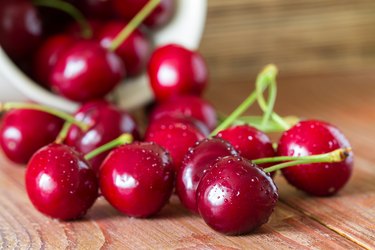
If you're living with irritable bowel syndrome (IBS), the last thing you want is to trigger symptoms like diarrhea, bloating and cramps. Certain fruit juices do just that. So can cherry juice and IBS go together? There are ways to enjoy cherries if you have IBS, but juicing isn't one of them.
Video of the Day
Video of the Day
Cherry Juice — Friend or Foe?
Wonder foods full of health benefits come and go, capturing the public's attention one day, and flying off shelves the next. A healthy beverage that might be here to stay is cherry juice — particularly tart cherry juice. According to a March 2018 review published in Nutrients, sweet and tart cherry juice contains high levels of anthocyanins, the water-soluble pigments found in red, purple and blue foods with powerful antioxidant properties.
Considered by some to be a magic elixir, Nutrients notes that human and animal studies suggest cherries may reduce the risk of arthritis, cardiovascular disease and diabetes, help to improve sleep and thinking, and combat a host of medical conditions. It's full of anti-inflammatory compounds, making it a possibility for enhancing muscle recovery after workouts.
But is it good for people with IBS? Unfortunately, the answer is no.
"The proposed benefits of cherry juice, and in particular tart cherry juice, is its anti-inflammatory capacity and antioxidant potential. However, drinking cherry juice in place of eating cherries removes what is likely their most important action in IBS: soluble fiber content and prebiotic potential," says Levi Teigen, PhD, RD, a registered dietitian and assistant professor at the University of Minnesota Medical School, Minneapolis.
Eat Them, Don’t Drink Them
The problem has to do with taking cherries and turning them into cherry juice. Cherries can be part of a gut-healthy diet for many people. However, it is typically preferable to eat cherries, rather than drink them. "Juicing cherries gets rid of healthy fiber, leaving you with a large fructose and sorbitol load," says Elena A. Ivanina, DO, a gastroenterologist at Lenox Hill Hospital in New York City. For people with IBS, fructose and sorbitol may exacerbate symptoms.
Fructose is a monosaccharide and sorbitol is a polyol, two types of FODMAPs (fermentable oligosaccharides, disaccharides, monosaccharides and polyols). According to a September 2017 meta-analysis published in Nutrients, FODMAPS are short-chain carbohydrates that are not absorbed efficiently in the small intestine. Because they're resistant to digestion, FODMAPs reach the far end of the small intestine without being absorbed into the blood. There they interact with gut bacteria, producing gas and bloating.
In people with IBS, FODMAPs also draw excess fluid into the bowel, causing diarrhea and cramping to occur. The 2017 meta-analysis found that a low-FODMAP diet significantly reduces IBS symptoms, such as pain and bloating.
The Bottom Line
But what about the benefits of cherry juice? If you have IBS, does that mean you must forgo the rich garnet fruit? "Cherries can be part of a gut-healthy diet. However, it's preferable to eat just a few whole cherries, rather than drinking their juice," Dr. Ivanina says.
Eating cherries, rather than drinking cherry juice, adds fiber to your system. Fiber may help improve bowel function, particularly in people with IBS and constipation (IBS-C). "Soluble fiber is a powerful food compound that can improve diarrhea and constipation," Dr. Teigen says.
"Even so, individuals with IBS may have sensitivity to some of the carbohydrates found in cherries specifically. Good fruit alternatives may be strawberries, raspberries or blueberries," Dr. Teigen adds. All of these colorful foods are high in anthocyanins.
And remember that with IBS, there can be too much of a good thing. According to the University of Michigan, fiber affects people with IBS differently, so cherries may not be helpful to you if your IBS symptoms include diarrhea.
Read more: What Are the Health Benefits of Dark-Red Cherries?
- Elena A. Ivanina, DO, gastroenterologist, Lenox Hill Hospital, New York City
- Nutrients: “A Review of the Health Benefits of Cherries”
- Nutrients: “Low-FODMAP Diet Improves Irritable Bowel Syndrome Symptoms: A Meta-Analysis”
- University of Michigan: “Irritable Bowel Syndrome: Controlling Symptoms With Diet”
- Levi Teigen, PhD, RD, registered dietitian, assistant professor, University of Minnesota Medical School, Minneapolis
Is this an emergency? If you are experiencing serious medical symptoms, please see the National Library of Medicine’s list of signs you need emergency medical attention or call 911.